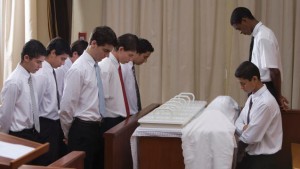8 Things Mormons Have to Juggle and How They Do It
Today, the world is celebrating all things juggling—and LDS.net has decided that the festivities should apply to the figurative, too.
See, every Mormon (member of The Church of Jesus Christ of Latter-day Saints) does his or her ample share of metaphorical juggling—responsibilities, activities, priorities—beyond the normal requirements of everyday life. For those left bewildered as to why and how some Mormons seem to be constantly bouncing from one thing to the next without any time to rest in between, this list could shed some light.
How do they constantly keep from dropping the ball? Here are 8 things many Mormons juggle—and the principles and methods behind their multitasking madness.
1) Callings

Most active Latter-day Saints are called to volunteer by their bishops or stake presidents and serve in important, specific capacities within their local wards or stakes. Most members give the extra time without thought, but that means less time is available for family, other work, or leisure.
Delegating is an important part of any position of responsibility, and it’s the main way many members juggle their callings. Mormons learn at a young age to get other people involved in the work so they don’t have to shoulder all the weight themselves. Additionally, each called member is also sustained unanimously by their congregation, meaning that there is always a host of support waiting in the wings just in case they have “one of those weeks.”
2) Tithing

Everyone looks forward to pay day. Active Mormons shoulder the additional financial strain of giving one-tenth of their earnings back to the Lord, contributing to a fund used to build buildings, help the needy and manage Church operations.
The law of tithing may seem like a hard thing to ask, because it is. It’s difficult for a reason—to help church members manage their finances responsibly and prove that they can be honest with someone else’s money.
Many members deal with tithing the same way they might manage the books for someone else’s business. They set aside money for specific purposes and stick to sound money management principles. They’re able to handle the economic acrobatics because they operate on an important principle: their money belongs to the Lord, not them. All He asks for is a tenth in return.
3) Social Situations

These days it’s hard to imagine a social gathering with people not of the same faith where an emotionally charged discussion about controversial social issues doesn’t arise. These situations are tough to handle tactfully, even for a disciple of Christ, who taught to turn the other cheek.
One social skill Latter-day Saints hold in the highest regard is empathy for the opinions of others. Most members strive to stand their ground without losing their heads or forgetting that everyone in the room is a child of the same God. Peacefully negotiating tricky situations can feel like walking on glass, but by keeping the focus on understanding rather than creating contention, members of the church deal with these situations with a sometimes quiet but resilient poise.
4) 2-year Mormon Missions

The years following high school graduation are the most important in a young person’s life, and many Mormons choose to spend 18 months to two years of them teaching others about the gospel of Jesus Christ rather than pursuing personal educational and professional goals. The transition into missionary service and back again is emotionally demanding—sometimes even painful.
Thankfully, the families and wards of those who serve often understand the awkwardness of this transition. Support from friends and neighbors eases the burden placed on young men and women as they return to a “normal” life that many might consider a few years above and ahead of them.
5) Home and Visiting Teaching

The church’s organization of Priesthood holders and its women’s organization, the Relief Society, each ask that their respective members take time each month to visit others within their fold. For men, these visits are known as home teaching assignments—for women, it’s called visiting teaching. Some of those visited are members who haven’t set foot in a church building in a long time.
For these monthly visits, each member has a companion teacher from the same organization to share the load. It’s not the same as delegation, but knowing someone has your back can make it easier to overcome the awkwardness of walking into an unfamiliar home and sharing an intensely personal message.
6) Mutual Night
The Church’s youth also have a special night set aside for their enrichment and to encourage meaningful social interaction between teenagers. A few lucky parents are called (see above about volunteers) to serve as chaperones whose voices can also act as spiritual and moral consciences.
For the teenagers, mutual night is about learning to make time for the spiritual things along with everything else. Their experience there may not grant them vaulting revelations and eye-opening epiphanies, but it will demonstrate the need for a wholesome and uplifting balance to all their fun.
Adults manage to squeeze in mutual nights because they understand how important the world’s youth are. They understand that those formative years will likely make or break a child’s moral compass. Though it’s tough, they make it work, and the experience can teach any member of any age about the true worth of even the smallest soul on Earth.
7) Sunday Church Meetings

Latter-day Saint church lasts three hours and happens every week. Taking a chunk out of our precious weekend, dedicating it to sitting in pews listening to speakers without any professional training and trying to actually get something uplifting out of the experience might seem crazy to some people.
The important thing for members, though, is the central focus of these meetings—the Sacrament. This is the weekly Mormon spiritual recharge, our offering of patience and faith and worship to the Lord in return for the blessing of emotional, spiritual and yes, even physical, renewal. Latter-day Saints get through Sunday by remembering what this life is really all about in the first place.
8) Family Home Evening

Latter-day Saint families have also been asked to dedicate one night a week to specially and spiritually focused family activities. This task is a balancing act—especially for parents of young children, who try week in and week out to convince their kids that sitting still is (sometimes) a good idea.
The immediate family is central to Mormon culture and philosophy. That principle can act as an enduring uplifting force for everyone who struggles to find time apart from all the other responsibilities and commitments they’ve already made to nourish the spiritual needs of the people they love the most.
Mormons juggle family night by being innovative, by creating new ways to involve everyone and leave no one behind. Things may not go off without a hitch every week, but Latter-day Saints understand that consistency is far more important than content when it comes to inviting the Spirit of God to dwell in the walls of a home.



